Winter 2014: Prose
Pie
Non-fiction by Suzanne Lehman
He wore the Richard Nixon mask.
He did it for me. He obtained a lemon cream pie and swirled a tall pile of whipped cream on top. He preserved the structural integrity of this dessert while he drove to the ivy covered building and climbed three flights of marble stairs to find my classroom. It was easy to locate, as the building was mostly empty at night, only the Writing 121 class in session.
I sat waiting and worrying while the professor, a long-haired young man in Levi cords, read a student’s work out loud. He was asking with barely veiled condescension if we could find any good in it. This professor was clearly irritated teaching dewy freshman how to write a decent essay. He seemed to view the endeavor as a galling demotion. He leaned into his snarky artifice and asked, “Can anyone tell me why we should care about Jennifer’s position in this work?” No one dared to raise a hand. In this silence, I could hear my brother enter the hall.
One week earlier, the professor had read my essay about the unnecessary nature of war. He used the words naïve and thin to describe my arguments. Sentence by sentence he dismantled my work. The room became very cold, and the uncomfortable shuffling of the other students’ feet was abrasively loud. Holding back tears and distant rage, I left class and ran directly to my older brother Steve’s fraternity house.
Steve was there in the pine A-frame structure, nestled in the woods. He was camped out on the sleeping porch smoking a bong and reading Elements of Economics. I sat across from him, wrapping the pilled plaid comforter onto my feet, and told him the story. As I took the bong from him and inhaled our mutual relief, I could see in Steve an urge to protect me. It came out of a closeness, a need in him, a need in me. It was there from as far back as I can remember.
In a black and white photo, taken when Steve was seven and I was three, the closeness was apparent. We are posed at the top of the steep street outside our rambling ranch style house. Steve, with his crew cut and blocky black glasses, is sitting in his gleaming child-sized fire truck. I am standing outside the wagon in a cotton sundress, my soft chubby arm around Steve’s neck, my hand resting on his cheek. He is smiling, his tiny white Chiclet teeth exposed, as he lets me love him. We grin at the camera without a care.
At this age, Steve was told he’d have to stay behind a year in school. His writing was too primitive for him to advance to second grade. His reading was not coming along. The letters for him were swimming on the page and he was unable to capture them, to make them into words. He was a bursting bright boy struggling to make sense from nonsense. At school, the teachers assumed he wasn’t trying hard enough and suggested he was lazy. At home, our father was exasperated by Steve’s challenges and was gruff with him, regularly calling him “numbskull” and “dumbbell” out of impatience.
I knew something of Steve’s trouble, but I wasn’t able to register it inside. Instead, I would happily follow him about and watch in awe as he surged through the world. Whether he was flying down the hill in his miniature fire truck, jumping off fences or picking up snapping crawdads with his bare hands, he was to me invincible.
Steve grew into the role of protecting me with vehemence. In the fifth grade, when the new boy, Joel Severson, teased me for wearing the bright yellow pantsuit my grandmother made, Steve went after him. The pantsuit was a fashion spectacle, but I had to wear it to please my grandmother. She crafted it by hand in her daylight basement bedroom, the Singer sewing machine laying down contrast white stitching on the textured polyester. The fabric was not subdued or pastel, it was electric yellow. She was pleased with her work and told me I was “a living doll.” This was more of a directive than a compliment. It was understood that I was to wear the pantsuit, and not for a second resist modeling what might be her finest Butterick moment.
Walking into the cafeteria the next day wearing the pantsuit, I felt self-conscious and scanned the room for a table with sympathetic friends. Joel came up from behind and jerked my sleeve down hard, hurting me. “You’re sour, lemon. You make me want to pucker.” Shocked, I yanked myself free and acted aloof, as if nothing had happened.
That night I told Steve about the incident while he watched his favorite show. He listened intently, but his eyes darted between me and the image of a debonair Bruce Wayne on the glowing screen. The next morning, Steve sought Joel out on the playground. Steve, with his sway back, tall wiry frame and premature gray eighth grade hair, loomed over Joel. He told him to never touch me again. Joel ignored me the rest of the year.
At fifteen, I was in summer school repeating the geometry course I had failed miserably. After class, on a piercingly hot July day, I dragged myself to the bus stop. I was overheated and beaten down by the theorems. The light cement reflected relentless sun into my face, blinding me while I stood droopy and exposed. Out of nowhere, Steve and his two best friends pulled up to the curb in our family’s Oldsmobile station wagon. They had been fishing for salmon, but catching mostly carp, on the banks of the Willamette River since dawn. With the radio blaring, Steve had all the windows rolled down and he waved to me.
“Jump in,” he said.
“Where are we going?” I asked.
“To eat. All we can,” he simply said.
He had plucked me out of an arid oblivion, saved me from the loneliness of the day. We drove directly to the suburban Village Inn’s all-you-can-eat buffet. On the way we sang at the top of our lungs, as the warm wind whipped through the car. Having just come from the river, Steve had no shoes and was rebuffed by the matronly hostess at the door. She pointed wordlessly to the “No shoes, no shirt, no service” sign. Undeterred, Steve went back to the car, found two Family Size Doritos bags, and slid them over his feet like slippers. He padded back into the restaurant and proceeded to eat all he could. I watched, mortified and proud.
Now I was a freshman in my first term away at college, and Steve was my lifeline to safety. He sat on his bunk bed and asked about the professor.
“How big is he?” Steve wanted to know. I described the teacher’s slight stature, his penchant for faded jean shirts and round wire rimmed glasses. I added that he was the worst kind of hippie, a fake hippie.
Steve looked at me and asked, “Fake like pretend?”
“No, fake like angry. He’s an angry hippie,” I said.
Steve shook his head in disgust. He took the bong, drew in a hit and as he exhaled said, “Those are the worst kind.”
We laughed and the reason for my visit seemed to float away. It was time to walk for donuts, bought in the evening at half price at the Piggly Wiggly. It was perhaps in the bakery aisle that Steve hatched the idea for his attack.
The following week Steve seemed happier and more energetic. I saw him at the university dining hall with his fraternity brothers. There was a mania to him and I asked what was going on. Steve explained he was planning a visit to my writing class that night, “to show that professor some humble pie, Stooges style.” I had an inkling of what he meant, but I did not let my mind follow the hunch.
“I’ll come in at seven fifteen and visit the class,” Steve said. “Pretend you don’t know anything about it.” I quickly realized the frenzied energy I’d felt rising off him was the boy-centric excitement that comes from planning a caper.
That night sitting in class, I heard footsteps echo through the empty hallway. I looked at the clock and saw it was time. Frozen with anticipation, and some regret that I hadn’t tried to stop him, I watched as my brother walked in the classroom wearing the rubber Richard Nixon mask. This was the mask worn for numerous Halloweens in the 1970s by Americans from coast to coast. It was the caricature of Nixon, the pitiful likeness of the man caught in a web of lies who had insisted on national television, “I am not a crook.” That image, comical and tragic, was being sported by my brother, who through the obscured mouth opening said, “Pie delivery, you jerk.”
Steve took short quick steps toward the professor, his sneakers squeaking on the linoleum floor. The mask was slightly twisted, making it hard for Steve to see, yet he hoisted the pie and hit the professor in the face. The entire class was stunned. There was no laughter, no hooting or hollering, only a collective gasp. Steve ran out of the class, followed by the professor, who was enraged and yelled, “God damn you!” The sound of two sets of feet rushing down the twisting stairs penetrated me.
The professor arrived back in the classroom minutes later, alone. The whipped cream was wiped from his eyes, but heavily populated his beard. His body was shaking, intensely alive from being assailed with a pastry. “If anybody in here was connected to this attack, you will be expelled,” he said. “Class is over. It’s over. God damn it.”
I walked slowly from class, trying to look unsuspicious. When I was out of visual scope of the building, I sprinted to Steve’s A-frame. I found him again on the sleeping porch. Afraid that campus security was coming after him, he had made a hasty attempt at hiding. He was buried in the covers, with merely the top of his head poking out. His arms were tucked up around his sides in a tight self-hug. He looked like a loosely wrapped mummy.
“Steve, what did you do?” I asked.
“I don’t know.” He sounded muffled and small from beneath the blanket.
“The professor is pissed. If we’re caught, we’ll get thrown out of school,” I said.
“I know. I didn’t think he would chase me.” His voice was anguished. “We’re lucky I had the getaway car.”
“You had a getaway car?” I said. Clearly there were accomplices. My legs were numb as I lowered myself and sat on the edge of the bed. I cautiously placed my hand on his vibrating foot. I waited. After his trembling had ceased, he threw the comforter off and sat up quickly, oddly renewed.
“Did I get him, though? Did I get his whole face?” Steve asked.
“You did. You totally nailed him,” I said.
“Oh my God, I did. I creamed him,” he laughed. He then happily relived the triumph he’d only glimpsed out of his peripheral vision, as he was fleeing the scene. We sat in the dark for an hour talking, feeling alternately scared and delighted with ourselves.
This is what it was to be protected by Steve, a wild unsettling comfort.
| |

|

|
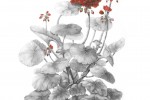 |
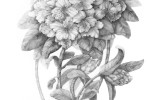 |
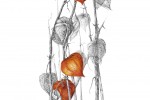 |
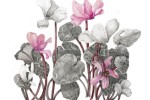 |
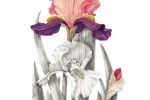 |
||||
|
Multi-faceted, poignant and inspiring. We’ve caught thirteen never-before-published poems by twelve master-class voices. |
Five women share their talent and themselves in new, surprising and heartfelt ways. |
Established craftswomen and aspiring visionaries add colorful richness to our most recent issue. |
The lyrical language of five young poets will delight you. |
Meet the authors and artists who make the Winter 2014 edition a rich, varied and engaging experience. |

|
LETTER FROM THE MANAGING EDITOR
POETRY After the Ice Storm by Linda Strever Waiting for a Diagnosis by Linda Strever Anticipation by Penelope Scambly Schott How to Survive the Loss of Your Best Friend by Diane Averill Current Conditions by Carol Ellis For a Hot Shot by Susan DeFreitas Focal Distance by Jenna Thompson Bridge by Jennifer Liberts Weinberg Motherhood by Elizabeth Stoessl Nice Girl Regrets by Pattie Palmer Baker Lost Child Lullabye by Tiah Lindner Rephael To Inhabit the Body by Willa Schneberg Love Letter by Annie Lightheart PROSE Like Water and Stones by B.E. Scully Messages by Mary Mandeville Fear Jars by Jessica Zisa Pie by Susan Lehman Confinement by Valerie Wagner ART Where the Buffalo and Unicorn Once Roamed by Katie Todd Midwestern Dreamin' by Katie Todd Monday's Child by Sarah Fagan Sweet Tea by Sarah Fagan The Daydream by Kendall Madden Beatrice by Kendall Madden YOUNG VOICES Chinese Mangos by Sophia Mautz The Bridge by Kate LeBlanc Ephemeral by Jillian Briglia The River by Sheila Panyam Compost by Sophia Mautz CONTRIBUTORS |
